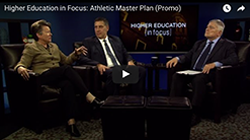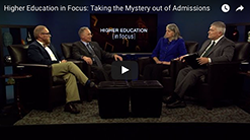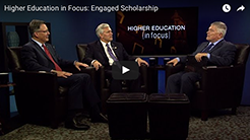Penn State president looks back over 12 months of sweeping change in Greek life
Dear Penn State Community:
This Sunday, Feb. 4, will mark the one-year anniversary of the death of student Timothy Piazza. The University continues to mourn his tragic passing. In the immediate aftermath, it became clear wholesale changes were needed to create a sustainable Greek system. We resolved to turn the pain and anguish radiating through our community into decisive reform.
Over the past year, the University instituted extensive new measures, which depart significantly from the Greek system’s self-governance model. We are making progress:
- The University assumed control of the fraternity and sorority organizational misconduct and adjudication process, and established a team of monitors who perform regular spot checks. These compliance checks have surfaced violations of our new safety rules and resulted in several chapters receiving sanctions.
- On Dec. 19, the University held a signing ceremony with 70 Greek organization leaders representing 49 chapters and the four governing councils (Interfraternity Council, Pahhellenic and Multi-Cultural Greek Council and the NPHC), acknowledging the expectations that the University has for its Greek organizations and members.
- We instituted our new deferred recruitment policy. Now, new students may not rush a sorority or fraternity until they have completed a full semester. Many sorority students report that waiting to rush this past semester was helpful, because they adjusted to academic and social life on campus, and are now better prepared to consider participation in Greek life.
- To help students and their families make more informed decisions about Greek life, we instituted a scorecard that reviews the performance of each chapter. It is meant to help students and families make informed decisions about Greek organizations at Penn State.
- University-hired chapter monitors are working with representatives of each fraternity house with respect to their chapter’s specific risk-management programs. Risk-management programs must be in place and approved by the University and must include details on how our restrictions on the size of gatherings, our ban on hard liquor, and various other required safety protocols will be implemented. The University must approve each plan before any socials involving alcohol are permitted.
- Our campus police participate in joint nightly patrols with State College Police as part of the Neighborhood Enforcement Alcohol Team at University Park. These patrols have detected safety violations and helped to hold students and chapters accountable for unsafe behavior.
- Our zero tolerance rule for serious hazing is in place, and will result in the permanent revocation of recognition of any chapter found to have violated the University’s requirement.
These measures are making a difference. I am encouraged that we have received letters from our local community about improved chapter behavior in State College. Local law enforcement and others report reduced crowd sizes at fraternity gatherings. Fraternity and sorority leaders are working more closely with the University to implement the new safety programs. This is important progress.
Unfortunately, however, significant problems remain. In addition to the permanent Beta Theta Pi ban, a total of 13 other Greek organizations at Penn State have received multi-year suspensions for safety violations. While these consequences demonstrate that we mean business, the large number of suspended chapters also shows that many students have ignored the call for behavior change and fallen short of our values and expectations.
One of the underlying tenets of belonging to a community is the shared responsibility for the safety and well-being of its members.
To that end, as we approach the one-year anniversary of a terrible tragedy we must do more:
- All of our students, as adults, must recognize the importance of safety and make changes in your own lives that will create a safer community.
- Our Greek-letter community needs to embrace the need for change and rededicate yourselves to a mission of service and community. We must do better.
- National Greek organizations absolutely must assume leadership responsibility. Three chapters that lost University recognition, Alpha Chi Rho, Alpha Sigma Phi, and Sigma Alpha Mu, did not receive chapter suspensions from their national offices. That is unacceptable.
- Parents and Greek alumni should provide a much higher level of support to their chapters and provide guidance and mentoring. Sadly, we found in our monitoring that parents of students in some chapters helped students violate the law and University rules against alcohol consumption.
- We must set a national example for reform. To that end, on April 23 and 24, I look forward to gathering university presidents, provosts and student affairs leaders from across the country to begin to explore ideas for cooperative action.
We also continue to work with Pennsylvania and federal legislators toward stricter hazing penalties. In short, we will not rest in our efforts, with the hope that this kind of tragedy never occurs again.
Thank you for your attention, and for your commitment to these efforts. Much remains to be done, and the memory of Timothy Piazza deserves nothing less than our collective action.
Sincerely,
Eric Barron




